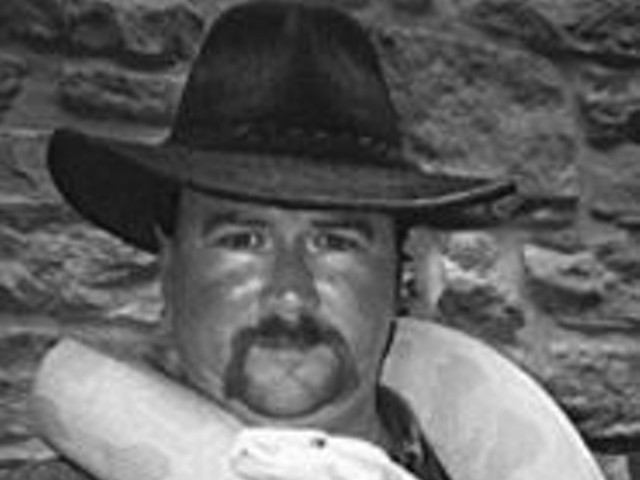For those "people that aren't experienced with the arts," a group in which Allison includes himself, La Cage is a light farce that centers on a middle-aged gay couple, an odd couple at that -- one restrained, the other a flaming drag queen. They attempt to placate the soon-to-be in-laws of the former's son by masquerading as man and wife. Silly, poignant, sentimental, La Cage provides audiences an entertaining entrée into a broader definition of family -- the kind Vice President Dick Cheney might adhere to when his right guard is down.
OK, it wasn't just the bar. "I did question the timing of La Cage aux Folles," Allison elaborates. He recalls the luncheon he held with Curtain Call Repertory Theatre's director Dennis Shelton, informing him of Allison's decision to cancel the barroom comedy. That luncheon was "the very same day the Supreme Court came down with the ruling on the Boy Scout issue. I felt it was such a politically hot topic, the timing might not be right for that kind of production and we ought to consider that in making our decision."
Allison contends that the Y is an inclusive organization. There is no gay issue. "You wouldn't see the Y having an issue anywhere like the Boy Scout issue. We welcome all people, both as employees, as members, as program participants, volunteers." (And besides, gay men have been meeting at the Y for years. And doesn't everybody love the song? "Young man ...." )
Curtain Call was -- until last month, when the company took its leave -- the resident performing-arts troupe at the West County Y's Chesterfield Community Theatre. One of the reasons the company left was the Y's skewed programming criteria. La Cage aux Folles was unsuited to the Y's mission to "build healthy spirits, minds and bodies," Allison says, reciting the credo, but Evita -- a musical about the rise of fascism in Chile with a heroine who sleeps her way to power -- conformed to that precept, apparently.
"Right," Allison responds quietly. "I don't know how to comment on that. I didn't characterize Evita in that way."
In Curtain Call's first full season, the community-theater group, consisting primarily of lawyers and doctors and secretaries and hotel managers -- not exactly mad bohemian types -- performed Gypsy, a play about a stripper, with stage settings that include a bawdy vaudeville house.
Allison has only been here two years and therefore missed the 1960s Stephen Sondheim musical; however, he says, "We would probably look at Gypsy. That is something we would probably look at to see if we felt it was appropriate."
Everything sure wasn't coming up roses with another Sondheim production, A Little Night Music, in which lovers entwine and disentangle sweetly to the strains of "A Weekend in the Country" and "Send in the Clowns." For the opening night of Curtain Call's production, someone from the arts-department staff put a sign on the door, alerting the audience that no one under the age of 18 would be allowed inside the theater -- a particularly surprising directive, given that Parkway West High School has presented the show.
Since when has A Little Night Music been NC-17?
Allison admits that evening was not one of the Y's proudest moments: "I thought that was a mistake to do. I said, 'We're not here to put ratings on productions.' I think if there is content that our constituents might consider not appropriate for younger children, we ought to at least let them make the decision as to whether or not to bring their kids. We ought to give them information in a friendly way and not prohibit people from viewing.
"That was not an appropriate method to handle that."
Allison speaks engagingly, earnestly. He's an altogether likable fellow whom Shelton describes as "a wonderful gentleman. He's a nice man. I just don't think he's well informed. Unfortunately, the amount of conversations that we had with the man never transpired unless I threatened to go to the media, and then he would call in a panic."
Shelton approached the West County Y three years ago, before Allison's tenure began, offering the club an abbreviated production of The Phantom of the Opera as a kind of audition piece. Curtain Call became the resident company soon thereafter. The Y funded the productions, paying royalties and financing sets and costumes -- for about $1,000 per show. Shelton gave Chesterfield "schlock theater" (his term) -- The Sound of Music, Mame, Hello, Dolly! But the company was itching for a greater challenge, and found it in Sweeney Todd (that wild Sondheim again), throat-slashing and cannibalism set to music.
Allison agrees that Sweeney brought Curtain Call, and the Y, the notoriety they needed. The press came out, the reviews were favorable and the production was nominated for 11 Arts for Life awards. A sold-out production of Jesus Christ Superstar followed. Annie, naturally, filled the seats, too. The budgets for productions increased as well, to $4,000-$7,000 per show.
But after the fiascos with La Cage and Night Music -- and a sudden budget reduction -- Assassins, Sondheim's paean to the great American tradition of murdering presidents, became Shelton's last stand. "I said, 'If you take Assassins out of my season, my company will not be here. I will not come back.'"
And that's what happened. Two days before auditions, new director of arts and humanities Kathy Nix (the third director in three years), true to her name, canceled Assassins. "I read the script," she says, "and I just didn't like the play. I didn't care for the subject of guns. It had quite a bit of verbal ... I don't know the right way to say it ... which we could cut out, but I just didn't agree with the content. I didn't want to program it, and I do have the authority to program and not program what the Y wishes to present."
Allison concurs. "There were two things that I read in the script," he says. "Language was pretty rough. Actually three [things]: there was one scene where someone was smoking a joint and one scene where someone's holding a gun to a child's head. We felt like that wasn't appropriate."
Shelton packed up his company, and The Music Man, and left, finding a home at the Faust Park outdoor amphitheater. Shows will be presented June 8, 9, 15 and 16, and tickets purchased for the Chesterfield production will be honored. They'll do Assassins there in the fall.
One of Shelton's complaints about Allison is that the executive director is known for the pronouncement "I want to put the C back in the YMCA."
"I hope they say that about me," says Allison. "I think that's a good thing. I think it's always been there. That's not a bad thing. I hope they're not saying I'm trying to take it out. When people say that to you, in what context are they saying that?" he asks.
They mean that C = Christian = censor.
"I'd like to answer that," Allison says. "No, that's not my job. That's not what I do. That's not my role here is to be a Christian censor. Just as the Y, as an institution, we have certain Christian principles we try to uphold -- to be an inclusive organization is one of them, being available to all people -- I wouldn't want to do anything to build any walls. We try to promote values of caring, honesty, respect and responsibility. We look at the theater as a tool to build a community, encourage self-confidence in kids and adults, and strengthen families. The mission of the Y is to put Christian principles into practice through programs that build healthy spirit, minds and bodies for all. All that we do, we use the mission as a filter for it, as an organization we do.
"As part of my job, I'm not running any crusade."
He listens thoughtfully to a description of La Cage as a depiction of an inclusive family, fully within the precepts of the aforementioned values. He listens, then contemplates a way of preparing audiences for approaching the play in such a way: "We could put it in our brochure. We could explain."
Before saying goodbye, he concludes, "Don't give up on us, or me."
So why was La Cage aux Folles removed from the schedule of theater offerings at the West County YMCA in Chesterfield?





